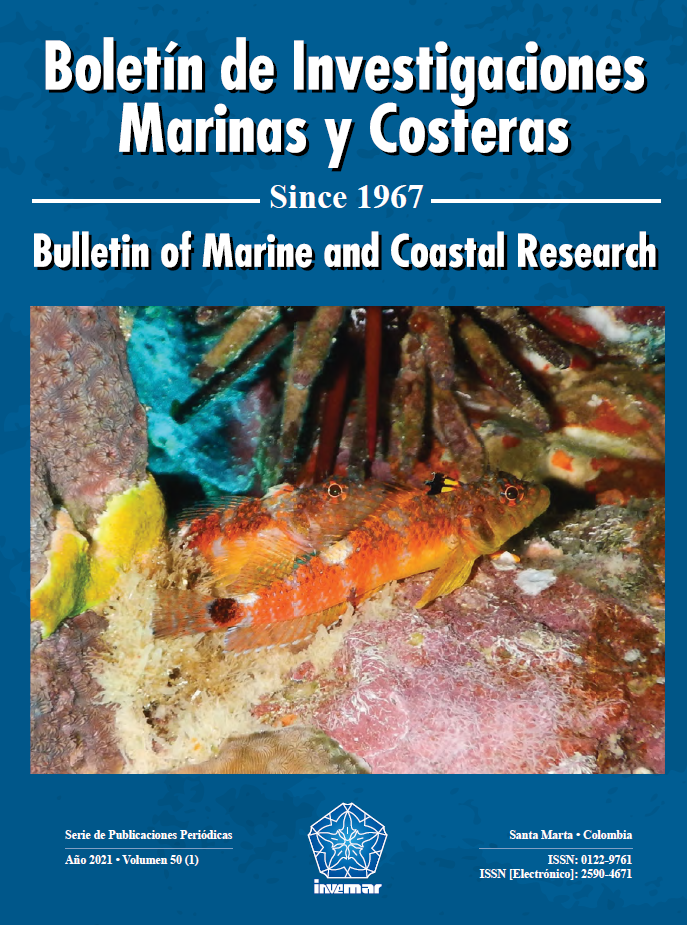Determinación de dimorfismo sexual usando técnicas morfométricas en Rachycentron canadum (Perciformes: Rachycentridae) cultivados en cautiverio
DOI:
https://doi.org/10.25268/bimc.invemar.2021.50.1.999Palabras clave:
Cobia, Morfometría geométrica, Morfometría de distancias, Caribe colombianoResumen
Rachycentron canadum es un pez con importancia económica en la acuacultura debido a su resistencia a variaciones ambientales, factibilidad de cultivo en confinamiento, altas tasas de crecimiento y buena aceptación de los consumidores. La rentabilidad de su cultivo en jaulas se ve afectada negativamente por la dificultad de implementar cultivos monosexo debido a la aparente semejanza entre los sexos. En este estudio se utilizaron técnicas morfométricas para determinar el dimorfismo sexual mediante el análisis de medidas y la forma de los peces. Se encontraron diferencias entre sexos en la posición de los ojos, labios, aleta pectoral y aleta ventral, y en la forma general del cuerpo. La precisión del sexado de los individuos fue de 75,4 % con distancias y 82,7 % con morfometría geométrica.
Citas
Adams, D.C., F.J. Rohlf and D.E. Slice. 2004. Geometric Morphometrics: Ten Years of Progress Following the ‘Revolution’. Ital. J. Zool., 71: 5-16. Doi: 10.1080/11250000409356545.
Bonino N. y E. Donadio. 2010. Parámetros corporales y dimorfismo sexual en el conejo silvestre europeo (Oryctolagus cuniculus) introducido en Argentina. Mastozool. neotrop, 17(1): 123-127.
Calle, D.A., M.L. Quiñones, H.F. Erazo y N. Jaramillo. 2008. Discriminación por morfometría geométrica de once especies de Anopheles (Nyssorhynchus) presentes en Colombia. Biomédica, 28(3): 371-385. Doi: https://doi.org/10.7705/biomedica.v28i3.75.
Cerviño, S. 2014. Estimating growth from sex ratio-at-length data in species with sexual size dimorphism. Fish. Res., 160: 112-119. Doi: https://doi.org/10.1016/j.fishres.2013.11.010.
Corti, M. and D. Crosetti. 1996. Geographic variation in the grey mullet: a geometric morphometric analysis using partial warp scores. J. Fish Biol., 48: 255-269.
Dutney, L., A. Elizur and P. Lee. 2017. Analysis of sexually dimorphic growth in captive reared cobia (Rachycentron canadum) and the occurrence of intersex individuals. Aquaculture, 468(1): 348-355. Doi: https://doi.org/10.1016/j.aquaculture.2016.09.044.
Dujardin, J.P., A.B. Henry and D. Kaba. 2010. The exchangeability of shape. BMC Research Notes, 3(266): 1-7. Doi: 10.1186/1756-0500-3-266.
Dujardin, J., D. Kaba, P. Solano., M. Dupraz, K.D. McCoy and N. Jaramillo-O. 2014. Outline-based morphometrics, an overlooked method in arthropod studies?. Infect. Genet. Evol., 28: 704-714. Doi: 10.1016/j.meegid.2014.07.035.
Fontaine, P., J.N. Gardeur, P. Kestemont and A. Georges. 1997. Influence of feeding level on growth intraspecific weight variability and sexual growth dimorphism of Eurasian perch Perca fluviatilis L. reared in a recirculation system. Aquaculture, 157: 1-9. Doi: https://doi.org/10.1016/S0044-8486(97)00092-6.
Franks, J.S., J.R. Warren and M.V. Buchanan. 1999. Age and growth of cobia, Rachycentron canadum. from the northeastern Gulf of Mexico. Fish. Bull., 97(3): 459-471.
Franks, J.S. and N.J. Brown-Peterson. 2002. A review of Age, Growth and Reproduction of cobia, Rachycentron canadum from U.S. Waters of the Gulf of Mexico and Atlantic Ocean. Gulf Carib. Fish. Inst., 53: 553-569.
Gandhi, V., V. Venkatesan and P. Zacharia. 2013. Biometry analysis, length-weight relationship and sexual dimorphism of the Spotted Scat, Scatophagus argus (Linnaeus, 1766) (Perciformes: Scatophagidae) from Gulf of Mannar southeast coast of India. J. Mar. Biol. Assoc. India, 55(1): 12-16. Doi: 10.6024/jmbai.2013.55.1.01743-02.
Holt, G.J., C.K. Faulk and M.H. Schwarz. 2007. A review of the larviculture of cobia Rachycentron canadum, a warm water marine fish. Aquaculture, 268: 181-187. Doi: https://doi.org/10.1016/j.aquaculture.2007.04.039.
Jónsdóttir, I.G., A.K. Gudlaugsdóttir and H. Karlsson. 2016. Morphometric differences between sub-populations of northern shrimp (Pandalus borealis). A case study from two adjacent fjords in Iceland. Reg. Stud. Mar. Sci., 3: 42-48. Doi: https://doi.org/10.1016/j.rsma.2015.04.002.
Kendall, D.G. 1989. A Survey of the Statistical Theory of Shape. Stat. Sci., 4(2): 87-120.
Leclercq, E., J.F., Taylor, D. Hunter and H. Migaud. 2010. Body size dimorphism of sea-reared Atlantic salmon (Salmo salar L.): Implications for the management of sexual maturation and harvest quality. Aquaculture, 301: 47-56. Doi: https://doi.org/10.1016/j.aquaculture.2010.01.029.
Liao, I.C., H. Ting-Shih., T. Wann-Sheng, H. Cheng-Ming., C. Su-Lean, E.M. Leaño. 2004. Cobia culture in Taiwan: current status and problems. Aquaculture, 237: 155-165. Doi: 10.1016/j.aquaculture.2004.03.007.
Marcus, L.F., M. Corti, A. Loy, G.J.P. Naylor, Slice D.E. 1993. Advances in Morphometrics. Tuscany, italy: NATO ASI Series. Series A. Life Sciences, 284: 588. Doi: 10.1007/978-1-4757-9083-2.
Marquez, C. 1995. Historia natural y dimorfismo sexual de la tortuga Kinosternos scorpioides en Palo Verde Costa Rica. Rev. Ecol. Lat., 2(1-3): 37-44.
Matai, J., R. Kastner, G.R. Cutter, D.A. Demer. 2012. Automated Techniques for Detection and Recognition of Fishes using Computer Vision Algorithms. Available at: https://swfsc.noaa.gov/publications/CR/2012/2012Matai.pdf
[Accessed 26 10 2015].
Mosqueira, J.R., P. Pinzón, H. Calderón y R. Vieira. 2011. Producción de alevines de cobia Rachycentron canadum (Linnaeus, 1766) en el centro de investigación, educación y recreación - Ceiner - (Cartagena. Colombia). AquaTic, 35: 35-42.
NOAA FISHERIES. 2013. Facial Recognition Technology and the Future of Fisheries Management. Available at: http://www.nmfs.noaa.gov/stories/2013/06/6_5_13video_monitoring.html [Accessed 26 10 2015].
Peckmann, T.R., K. Orr, S.K. Meek and Manolis. 2015. Sex determination from the talus in a contemporary Greek population using discriminant function analysis. J. For. Leg. Med., 33: 14-19. Doi: 10.1016/j.jflm.2015.03.011.
Quinn, G.P. and M.J. Keough. 2002. Experimental Design and Data Analysis for Biologists. Cambridge: Cambridge University Press, 530 pp.
Rohlf, F.J. 1990. Morphometrics. Annu. Rev. Ecol. Syst., 21: 299-316. Doi: https://doi.org/10.1146/annurev.es.21.110190.001503.
Sanabria C., L.C. Polo y M.C. Botella. 2011. Dimorfismo sexual en primera vértebra cervical en una muestra de población colombiana. Rev. Espan. Med. Leg., 37 (4): 140-145.
Sun, L., H. Chen and L. Huang. 2006. Effect of temperature on growth and energy budget of juvenile cobia (Rachycentron canadum). Aquaculture, 261: 872-878. Doi: 10.1016/j.aquaculture.2006.07.028
U-Yong, L., K. In-Beom and K. Dai-Soon. 2015. Sex determination using discriminant analysis of upper and lower extremity bones: New approach using the volume and surface area of digital model. For. Sci. Int., 253: 135. e1-4. Doi: 10.1016/j.forsciint.2015.05.017.
Williams, K., C. Rooper and J. Harms. 2012. Photographic and videographic imagery collection and analysis activities at the Coral Reef Ecosystem division of the NOAA Pacific Islands Fisheries Science Center. Report of the National Marine Fisheries Service Automated Imaged Processing Workshop, 18-20.
Zelditch M., D. Swiderski, D. Sheets and W. Fink. 2004. Geometric morphometrics for biologist:A Primer. s.l.:Academic Press, 437 pp.
Descargas
Publicado
Versiones
- 2021-07-06 (2)
- 2021-06-30 (1)
Cómo citar
Número
Sección
Licencia
Derechos de autor 2021 Boletín de Investigaciones Marinas y Costeras

Esta obra está bajo una licencia internacional Creative Commons Atribución-NoComercial-CompartirIgual 4.0.


